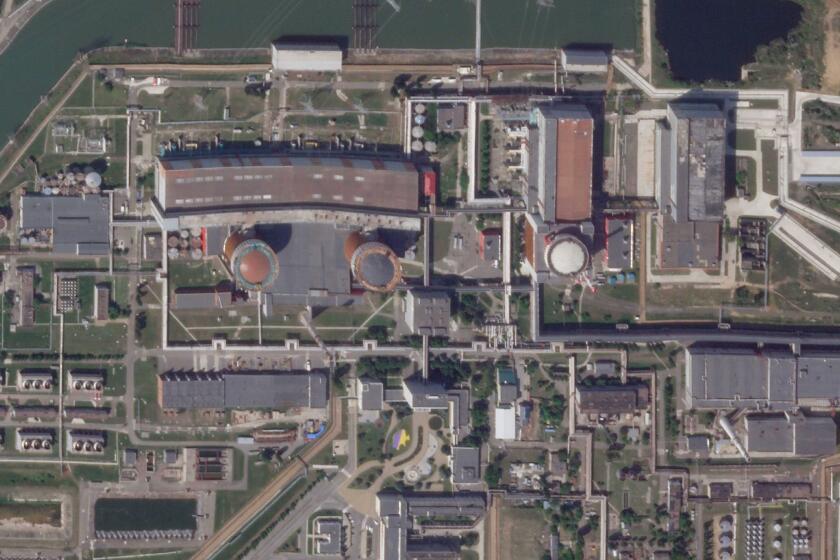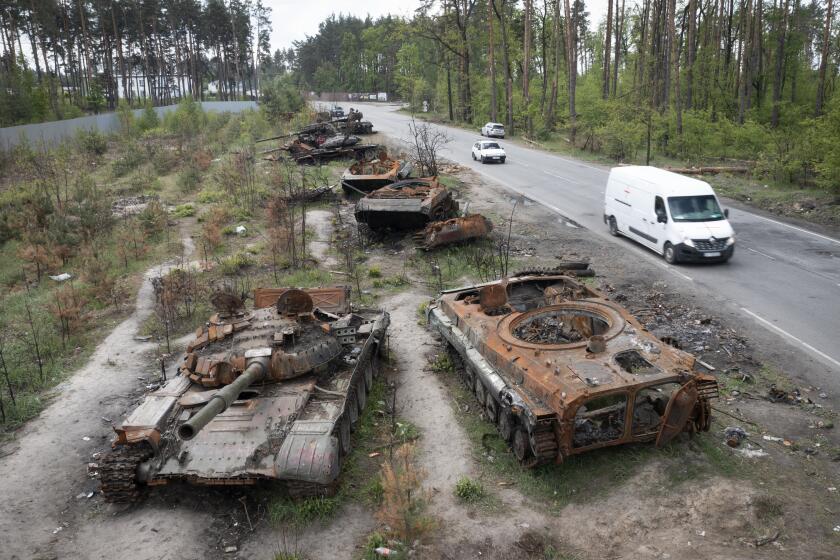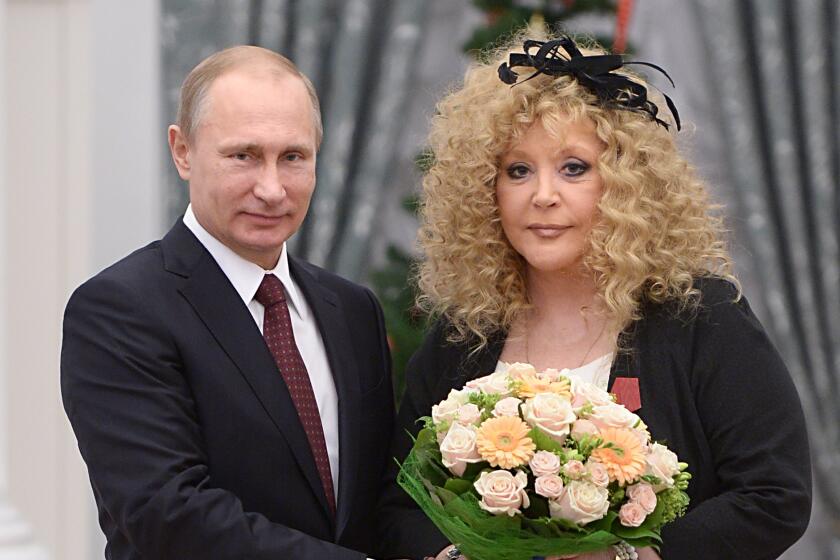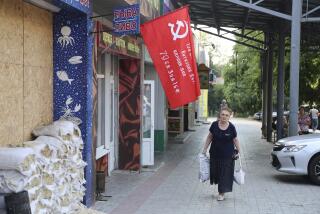As Moscow’s losses mount, 4 separatist regions in Ukraine to vote on joining Russia
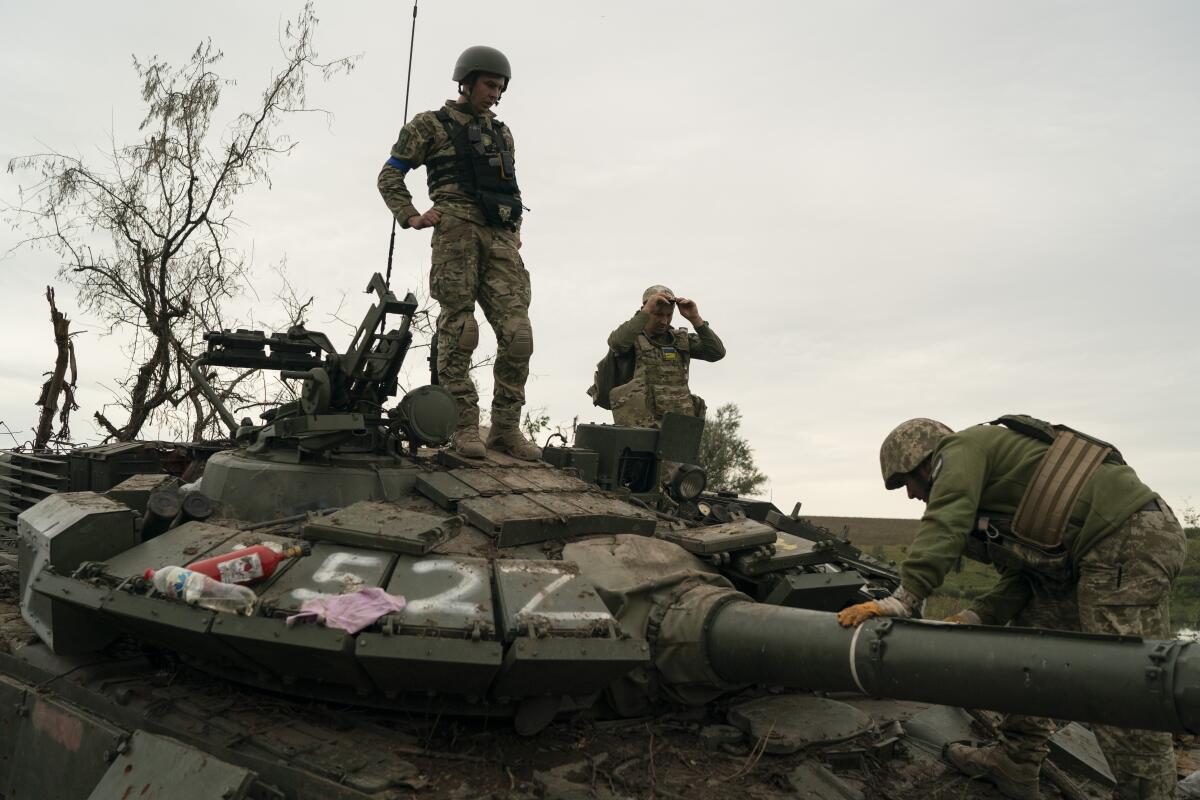
- Share via
KYIV, Ukraine — Russia-controlled regions of eastern and southern Ukraine announced plans Tuesday to start voting this week on whether to become part of Russia. The concerted and quickening Kremlin-backed efforts to swallow up four regions could set the stage for Moscow to escalate the war against Ukrainian forces successfully battling to wrest back territory.
The announcements of referendums starting Friday in the Donetsk, Luhansk, Kherson and partly Russian-controlled Zaporizhzhia regions came after a close ally of Russian President Vladimir Putin said the votes were needed, and as Moscow is losing ground in the invasion it launched nearly seven months ago, increasing pressure on the Kremlin for a stiff response.
Former President Dmitry Medvedev said incorporating those regions into Russia would make redrawn frontiers “irreversible” and enable Moscow to use “any means” to defend them.
Ukrainian Foreign Minister Dmytro Kuleba denounced the votes as a sham and tweeted that “Ukraine has every right to liberate its territories and will keep liberating them whatever Russia has to say.”
The votes, in territory Russia now controls, are expected with near-certainty to go Moscow’s way but are unlikely to be recognized by Western governments backing Ukraine with military and other support.
Luhansk and Donetsk together form the Donbas region, which has been gripped by separatist conflict since 2014; Putin has set their capture as a primary objective of the Russian invasion.
A Ukrainian medic captured in the deadly siege of Mariupol tells U.S. lawmakers how Russians routinely tortured her and other prisoners, some fatally.
In Donetsk, separatist leader Denis Pushilin said the “long-suffering people of the Donbas have earned the right to be part of the great country that they always considered their motherland.”
In partly Russian-occupied Zaporizhzhia, pro-Russia activist Vladimir Rogov said: “The faster we become part of Russia, the sooner peace will come.”
Pressure within Russia and from Moscow-backed leaders in the breakaway regions to hold votes expediting their absorption into Russia has increased in the face of a Ukrainian counteroffensive — bolstered by Western-supplied weaponry — that is wresting back large areas of previously Russian-occupied territory.
Former Kremlin speechwriter and Russian political analyst Abbas Gallyamov said on Facebook that the separatists appeared “scared that the Russians will abandon them” and were forging ahead with referendums to force the Kremlin’s hand.
Ukrainian officials say a second nuclear power plant, after the one in Zaporizhzhia, is in danger of being struck by Russian weapons.
In another signal that Russia is digging in for a protracted and possibly ramped-up conflict, the lower house of parliament voted Tuesday to toughen laws against desertion, surrender and looting by Russian soldiers.
Lawmakers also voted to introduce possible 10-year prison terms for soldiers refusing to fight. If approved, as expected, by the upper house and then signed by Putin, the legislation would strengthen commanders’ hands against failing morale reported among soldiers.
Kremlin spokesman Dmitry Peskov said Tuesday that there are no prospects for a diplomatic settlement to the conflict. Medvedev, the deputy head of Russia’s Security Council, said votes in separatist regions were important to protect their residents and “restore historic justice” and would “completely change” Russia’s future trajectory.
“After they are held and the new territories are taken into Russia’s fold, a geopolitical transformation of the world will become irreversible,” said Medvedev.
“An encroachment on the territory of Russia is a crime that would warrant any means of self-defense,” he said, adding that Russia would enshrine the new territories in its constitution so that no future Russian leader could hand them back.
Breaking News
Get breaking news, investigations, analysis and more signature journalism from the Los Angeles Times in your inbox.
You may occasionally receive promotional content from the Los Angeles Times.
“That is why they fear those referendums so much in Kyiv and in the West,” Medvedev said. “That is why they must be held.”
Ukrainian analyst Volodymyr Fesenko, head of the independent Penta Center think tank based in Kyiv, said that the Kremlin hopes the votes and the possibility of military escalation will spur Western governments to put more pressure on Ukrainian President Volodymyr Zelensky to start talks with Moscow.
The move “reflects the weakness, not the strength of the Kremlin, which is struggling to find levers to influence the situation that has increasingly spun out of its control,” he said.
The recapturing of large areas of previously Russian-occupied territory, most notably in the Kharkiv region in the northeast, has strengthened Ukraine’s arguments that its troops could deliver more stinging defeats to Russia with additional armament deliveries.
A Russian paratrooper has self-published an explosive memoir about his experiences in Ukraine. But not everyone considers him a hero for doing so.
More heavy weaponry is on its way, with Slovenia this week promising 28 tanks and Germany pledging four self-propelled howitzers. More aid also is expected from Britain, already one of Ukraine’s biggest military backers after the U.S. British Prime Minister Liz Truss said her government will “match or exceed” the $2.6 billion in military aid given to Ukraine this year.
The swiftness of the Ukrainian counteroffensive also saw Russian forces abandon armored vehicles and other weapons as they beat hasty retreats.
Ukrainian forces are recycling captured weaponry back into battle. A Washington-based think tank, the Institute for the Study of War, said Tuesday that abandoned Russian T-72 tanks were being used by Ukrainian forces seeking to push onward into Russian-occupied Luhansk.
“The initial panic of the counteroffensive led Russian troops to abandon higher-quality equipment in working order, rather than the more damaged equipment left behind by Russian forces retreating from Kyiv in April, further indicating the severity of the Russian rout,” the institute said.
In the counteroffensive’s wake, Ukrainian officials found hundreds of graves near the once-occupied city of Izyum. Yevhenii Yenin, a deputy minister in Ukraine’s Internal Affairs Ministry, told a national telecast that officials exhuming the dead there found bodies “with signs of violent death.”
At the risk of being branded a traitor, pop singer Alla Pugacheva has become the most prominent Russian celebrity to question the war in Ukraine.
“There are many of them,” Yenin said. “These are broken ribs and broken heads, men with bound hands, broken jaws and severed genitalia.”
Meanwhile, a Ukrainian push continues in the south of the country. Ukraine’s southern military command said early Tuesday that its troops sank a Russian barge carrying troops and weapons across the Dnieper River near the Russian-occupied city of Nova Kakhovka, in the Kherson region. It offered no other details on the sinking. The Kherson region has been a major target of Kyiv’s fight.
Zelensky’s office said shelling killed three civilians and injured 19 in a 24-hour span.
In a daily intelligence briefing, the British Ministry of Defense said that Moscow has likely moved its Kilo-class submarines from their station on the Crimean peninsula to southern Russia over fears of long-range Ukrainian fire. The ministry said the submarines had “almost certainly” been moved to Krasnodar Krai in mainland Russia from a naval base in Sevastopol in Russian-controlled Crimea.
More to Read
Sign up for Essential California
The most important California stories and recommendations in your inbox every morning.
You may occasionally receive promotional content from the Los Angeles Times.

